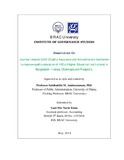| dc.contributor.advisor | Aminuzzaman, Professor Salahuddin M. | |
| dc.contributor.author | Islam, Gazi Md. Narul | |
| dc.date.accessioned | 2015-03-06T09:39:08Z | |
| dc.date.available | 2015-03-06T09:39:08Z | |
| dc.date.copyright | 2014 | |
| dc.date.issued | 2014-05 | |
| dc.identifier.other | 13372018 | |
| dc.identifier.uri | http://hdl.handle.net/10361/4060 | |
| dc.description | This thesis is submitted in partial fulfillment of the requirements for the degree of Masters of Arts in Governance and Development, 2014. | en_US |
| dc.description | Cataloged from PDF version of thesis report. | |
| dc.description | Includes bibliographical references (page 83 - 88). | |
| dc.description.abstract | Quality of higher education is believed to be one of the most important aspects of national
development through human resource development, imparting knowledge and social uplift
in a country. Higher education institutions in general and policy agencies including ministry
of education of Bangladesh are realizing the increasing role in national uplift through
improving quality of higher education.
Purposes of this study are manifold: to explore the existing quality status and analyze the
gaps between existing practices and formal quality assurance and accreditation (QAA)
systems’ practices, and to assess and tap the institutional learning and challenges of
introducing of QAA mechanism in Bangladesh. Primary data are collected in order to
determine the perceptions of faculty members towards quality improvement initiatives in
Higher Education Institutions (HEIs). However, the intension is to explore the preparedness
to introduce formal QAA mechanism and their implications on the institutional performance
in the context of Bangladeshi HEIs.
The study revealed that HEIs in Bangladesh face a number of challenges in terms of formal
quality assurance practices. The key variables brought from formal QA framework fell into
six quality areas: leadership and institutional governance, curriculum, facilities, student,
staff, and quality assurance process development. The study suggests that introducing formal
QAA mechanism in HEIs in Bangladesh, the main challenge lies with quality assurance
process development. Existing quality status from this study shows that quality areas of
student, curriculum and facilities remain above the average level of standard, but the quality
areas of leadership and institutional governance, staff and quality assurance process
development are at worse condition as the surveyed population i.e. university teachers
opined.
The findings would assist academicians to enhance quality assurance framework at national
level as well as institutional level. However, the challenges the individual higher education
institution would encounter to implement the formal QAA mechanism are addressed at
length. | en_US |
| dc.description.statementofresponsibility | Gazi Md. Narul Islam | |
| dc.format.extent | 96 pages | |
| dc.language.iso | en | en_US |
| dc.publisher | BRAC University | en_US |
| dc.rights | BRAC University dissertation are protected by copyright. They may be viewed from this source for any purpose, but reproduction or distribution in any format is prohibited without written permission. | |
| dc.subject | Governance and development | en_US |
| dc.subject | Quality Assurance and Accreditation (QAA) mechanism | en_US |
| dc.subject | Higher Education Institutions (HEIs) | en_US |
| dc.title | Journey towards QAA (Quality Assurance and Accreditation) mechanism to improve quality education of HELs (Higher Education Institutions) in Bangladesh - issues, challenges and prospects. | en_US |
| dc.type | Thesis | en_US |
| dc.contributor.department | BIGD, BRAC University | |
| dc.description.degree | M. Governance and Development | |

